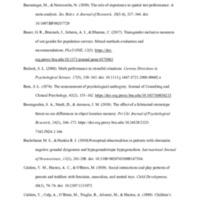Browse Exhibits (1 total)
Alexis Detrich | Examining Gender Identity in Spatial Ability

Broadly, gender identity research has received more attention in recent years as research indicates that previous conceptions about gender identity and incongruence with sex are incorrect and are now known to occur from biological and environmental differences. Much of the research on spatial cognition focuses on sex differences found among certain tests of spatial ability (e.g., Levine et al., 2016; Nazareth et al., 2019; Voyer, Voyer, & Bryden, 1995). However, little to none of the research considers the role of gender identity in spatial abilities. Gender identity, defined as the internal identification and expression of gender (Money & Ehrhardt, 1987), differs from sex in the sense that sex is assigned by a physician at birth, and does not always represent how the individual identifies later in life. As not much research exists on the measurement of individual high in masculine or feminine traits but who do not hit the threshold for gender incongruence with their sex, this study aims to address how varying levels of masculinity and femininity in individuals may influence performance on spatial ability tasks. Mental rotation tasks, spatial anxiety scales and object-location memory tasks were selected on the basis that each have a robust literature backing male or female advantages (ex: Voyer, Voyer, & Bryden, 1995; Lawton, 1994).
Faculty Mentor: Dr. Daniele Nardi
Psychological Sciences
Undergraduate
